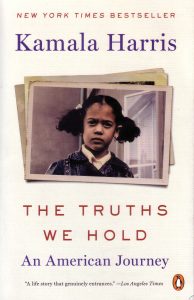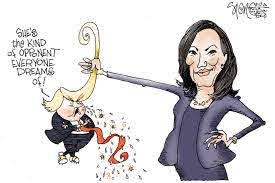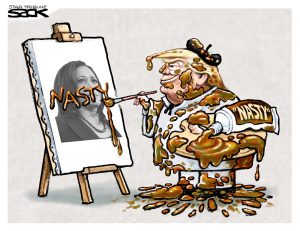A book review
by Sachi Sri Kantha, November 17, 2020
 Kamala Harris – The Truths We Hold – An American Journey, Penguin Press, New York, 2019, 318 pp.
Kamala Harris – The Truths We Hold – An American Journey, Penguin Press, New York, 2019, 318 pp.
The back cover blurb for this book states, “An engaging read that provides insights into the influences of [Harris’s] life – most of all, her mother Shyamala Gopalan Harris, Ph.D., a breast cancer researcher… Revealing and even endearing. – San Francisco Chronicle.”
Overall, I endorse these sentiments. This book is indeed a paen to Kamala’s mother Shyamala Gopalan (1938-2009), who hailed from Tamil Nadu, India. Though Shyamala was born in Chennai, her parents Venkataraman Gopalan and Rajam were from Painganadu and Thulasenthirapuram villages near Mannargudi. Thus, for the first time in the history of United States of America, a daughter of a Tamil lady will become the elected Vice President of the country in January 2021, at the age of 56 years and 3 months.
 During the Vice presidential debate held on October 7th, with the current Vice President Mike Pence, Kamala Harris spoke as follows:
During the Vice presidential debate held on October 7th, with the current Vice President Mike Pence, Kamala Harris spoke as follows:
“Let me tell you first of all, the day I got the call from Joe Biden, it was actually a Zoom call, asking me to serve with him on this ticket was probably one of the most memorable days of my life. I thought about my mother, who came to the United States at the age of 19, gave birth to me at the age of 25 at Kaiser Hospital in Oakland, California. And the thought that I’d be sitting here right now, I know, would make her proud. And she must be looking down on this. Joe and I were raised in a very similar way. We were raised with values that are about hard work, about the value and the dignity of public service, and about the importance of fighting for the dignity of all people. And I think Joe asked me to serve with him because I have a career that included being elected the first woman District Attorney of San Francisco, where I created models of innovation for law enforcement, in terms of reform of the criminal justice system.”
In ten chapters of this book, Kamala offers details about her childhood as a daughter of a divorced scientist-mother, undergraduate years at Howard University, years as the district attorney of San Francisco, attorney general of California and as the elected senator of California, replacing Ms. Barbara Boxer (b. 1940). For Kamala, the road to the race for White House was not an easy one. She had to face sexism, naked racism and other obstacles such as accumulating campaign funds. After her splendid performance misogynist President Donald Trump called her ‘this monster’. https://www.nytimes.com/2020/10/13/opinion/letters/trump-kamala-harris-monster.html
In this autobiography, Kamala amply reveals the strength imbibed from her mother’s training and wisdom, as an immigrant to the USA, to withstand such insults. “She [Shyamala Gopalan Harris] was the one most responsible for shaping us into the women we would become. And she was extraordinary. My mother was barely five foot one, but I felt like she was six foot two. She was smart and tough and fierce and protective. She was generous, loyal and funny. She had only two goals in life: to raise her two daughters and to end breast cancer. She pushed us hard and with high expectations as she nurtured us…”
For Shyamala Gopalan, her 1963 marriage with her peer Donald Harris from Jamaica at the University of California, Berkeley, soured after 7 years. She filed for divorce in December 1971, at the age of 33; according to Court records, she won custody of her daughters Kamala and Maya in June 1973. Kamala had written, “They didn’t fight about money. The only thing they fought about was who got the books. I have often thought that had they been a little older, more emotionally mature, maybe the marriage could be survived. But they were so young. My father was my mother’s first boyfriend.”
Furthermore, Kamala writes, “My mother, grandparents, aunts and uncle instilled us with pride in our South Asian roots. Our classical Indian names harked back to our heritage, and we were raised with a strong awareness of and appreciation for Indian culture. All of my mother’s words of affection or frustration came out in her mother tongue – which seems fitting to me, since the purity of those emotions is what I associate with my mother most of all.” Though much was talked in the Indian newsmedia on the use of endearing Tamil kinship word ‘Chitti’ (‘younger mother’) by Kamala, early this year, the irony is that Kamala never mentions ‘Tamil’ in the book, – not even once! Is she being politically correct here? I would be interested in knowing what specific Tamil words, her mother used when she showed affection or suffered frustration.
And about her name – in the preface to the book, Kamala had written, “First, my name is pronounced ‘comma-la’, like the punctuation mark. It means ‘lotus flower,’ which is a symbol of significance in Indian culture.” In reality, Tamils don’t pronounce Kamala, as ‘comma-la’. It is pronounced, as it is spelled. I’m pretty sure that Shyamala or Kamala’s grandparents wouldn’t have called her as ‘comma-la’. Kamala Harris shares her beautiful name with the famous bharathanatyam dancer and actress Kamala Laxman (b.1934). She is called as Kamala by Tamils, and not Commala. In fact, there is another name Komala; one of Tamil playback singer is A.P. Komala (b. 1934). Here, the meaning of Komala is ‘youthful grace’.
 Few bon mots of Kamala which appear here and there include,
Few bon mots of Kamala which appear here and there include,
“Modern campaigns rely on big data, analytics, and sophisticated voter turnout models. But in my experience, I’ve found that a friend, a pen, and a bowl of spaghetti are just as effective.”
“The American people have not given up on the American Dream. I know this to be true. But when you can’t sleep at night, how can you dream?”
“The goal of economic growth has to be to grow the pie. But if all that’s left for workers are the crumbs, what kind of economy are we really building?”
“I am not simply saying that the job of an elected official is not to sing a lullaby and soothe the country into a sense of complacency. The job is to speak truth, even in a moment that does not welcome or invite its utterance.”
“A patriot is not someone who condones the conduct of our country, whatever it does; it is someone who fights every day for the ideals of the country, whatever it takes.”
Though not nit-picking, it should be mentioned because the title of this autobiography includes the word ‘truth’. Kamala had revealed amply what one can say as ‘public truth’ about America (especially San Francisco and California politics); but a little bit of ‘private truth’ had been omitted, either by design or by accident. I refer to her past relationship with Black politician Willie Brown (b. 1934). According to an article in SF Weekly by Peter Byrne, which appeared in September 24, 2013,
“Harris met Brown in 1994, when he was Speaker of the State Assembly. She was 29, he was 60. Their May/December affair was the talk of the town during the year before Brown’s successful 1995 bid to become mayor. But shortly after he was inaugurated, Harris dumped Brown, a notorious womanizer….”[check the link, https://www.sfweekly.com/news/kamalas-karma/] Former Democratic governor of California Jerry Brown (b. 1938) is passingly mentioned in the book, but not Willie Brown. I, for one, would have liked to know what Kamala’s mother would have conveyed to her about this Willie Brown affair?
Maybe, partly because of the failed marriage of her mother, Kamala married late at the age of 49 – on August 22, 2014. Her husband, Dough Emhoff (b. 1964) was a Jewish divorcee and attorney and entertainment litigator. He was only a week older than her. Kamala writes that she is in good terms with her husband’s ex-wife Kerstin. “As Kerstin and I got to know each other, we really hit it off ourselves and became friends. (We sometimes joke that our modern family is almost a little too functional.)” Kamala had dedicated the book to her ‘darling husband’, and ends the book with acknowledgment to her mother,
“Mommy, you are the star of this book because you were the reason for everything. It’s been almost ten years since we lost you, and I miss you so much. Life without you is still hard to accept. But I believe you are staring down at us. When I am stuck with a hard decision, I ask, ‘What would Mommy think?’ And in that way, you are here. It is my sincerest hope that this book will help those who never met you understand the kind of person you were. What is meant to be Shyamala Harris. And what it means to be her daughter.”
The book is supplemented with 65 photos, from family albums. Though Kamala’s father Prof. Donald Harris disappears from the book in page 20, photos of him with Shyamala and holding the baby Kamala do appear in the collection. Photos of Kamala, with paternal grandparents (Oscar Joseph and Beryl) and her paternal great grand mother Iris Finegan, in Jamaica are also included. Sadly missing are the impressions about Kamala’s trip to Jamaica, during her childhood.
As one can infer, this autobiography belongs to the campaign autobiography genre – something revealed, something hidden, something obfuscated – a ‘rushed job’. It has all the relevant name droppings – Martin Luther King, Coretta Scott King, Chief Justice Earl Warren, Justice Thurgood Marshall, James Baldwin, Cesar Chavez, Bill Gates and Harvey Milk . As a political strategist, Kamala was courageous enough to run for the California Senate race vacated by Barbara Boxer in 2016 and win. Joe Biden also receives one mention in a sentence: “I was sworn in on January 3, 2017, by Vice President Joe Biden during his final month in office, and moved into a basement office alongside other newly elected senators.”. Then, after two years as a rookie senator of California, Kamala again took the courageous decision first to plunge into the Democratic Presidential primaries for 2020 and also to withdraw in time for consideration as the woman running mate by president elect Joe Biden. For such perceived insight of Kamala Harris as the Vice President, we have to wait for another 4 or 8 years.